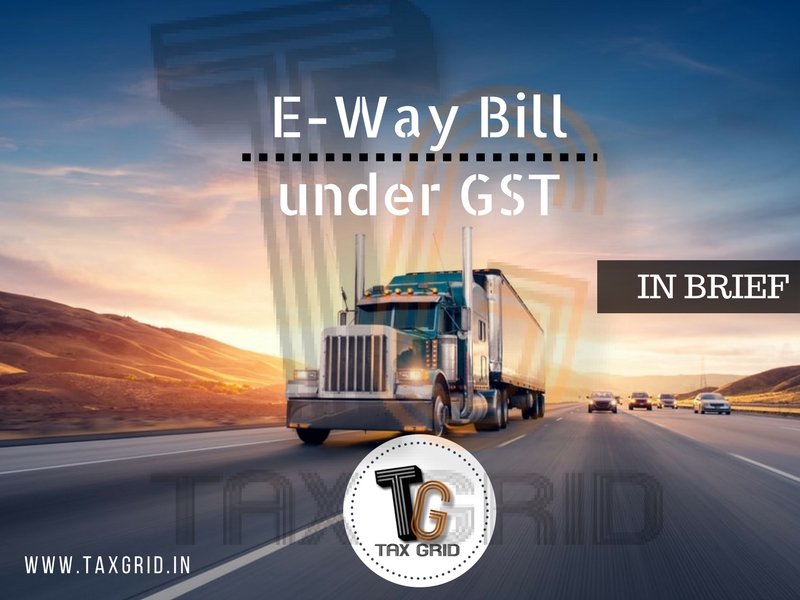Dealing with E-way Bill under GST

E-Way Bill under GST is an electronically generated document that has to be carried by the person in charge of a conveyance, carrying a consignment of goods. It is to be generated on the common portal which is http://e-waybill.nic.in by registered person or transporter. E-Way bill under GST is mandatory to be filed from 01.02.2018 in a case where consignment value exceeding Rs. 50,000/- is moving interstate. However, in the case where goods are being sent to job worker to outside the state for job work, E-Way bill will be mandatory irrespective of consignment value.
Generation of E-Way Bill under GST
The registered consignor or consignee of the goods is permitted to generate an E-Way Bill after submitting the details in Form GST EWB-01 on the common portal.
An unregistered transporter can also enroll on the common portal and receive TRANSIN or Transporter ID after which he can generate an E-Way Bill for the movement of goods for his client.
E-Way bill has two parts. Part A is to be furnished in by the person causing movement of goods, whereas Part B will be furnished by the transporter. In case, the registered person (consignor or consignee) is transporting the goods, the said person is required to furnish both Part A and B. In case, goods are handed over to a transporter for movement of goods, the registered person can furnish the information for both Part A and Part B or Part B can also be entered by the transporter by entering the TRANSIN in the said Form.
Upon generation of the E-Way Bill on the common portal, a unique EWB Number will be available to the supplier, recipient and the transporter.
Confirmation of E-Way Bill under GST
The details of the E-Way Bill generated would be made available to a registered recipient, on the common portal. Such registered person is required to accept or reject the movement of the goods covered by the E-Way Bill under GST. In the event, such registered recipient does not accept or reject the E-Way Bill within the period of seventy-two hours on the common portal, it would be deemed that such recipient has accepted the details in the E-Way Bill.
Cancellation of E-Way Bill under GST
The E-Way Bill once generated in GST EWB-01 cannot be altered or modified. In the event the goods are either not transported or transported as per the details in the E-Way Bill, the E-Way Bill can be cancelled electronically on the common portal. The time-limit to cancel is within 24 hours of generating the e-way bill under GST.
Multiple modes of transportation
In case, multiple modes of transportation are used for the movement of the consignment of goods, no new E-Way Bill must be generated. As per the mode of transportation, the E-Way Bill can be updated with the new mode of transportation by using ‘Update Vehicle Number’ in GST EWB-01.
It is required to be noted that, in case of multiple modes of transportation of the goods, the EWB must be updated with the transport document details within one hour of submission and collection of transport document from rail/ship/air authority. Further, Part B of the GST EWB-01 must be updated before the movement of the goods.
Validity Period
The validity period of E-Way Bill under GST, for a distance of 100 km is one day. For every 100km or part thereof after, an additional of one day is added to the validity period of the E-Way Bill.
Read FAQ’s on E-way Bill at https://taxgrid.in/2017/12/20/faqs-electronic-way-bill/
Authored by CA Tripti Jindal.
Views expressed above are that of Author and TaxGrid shall not be responsible for any error in the same and consequences thereof.





Leave a Reply